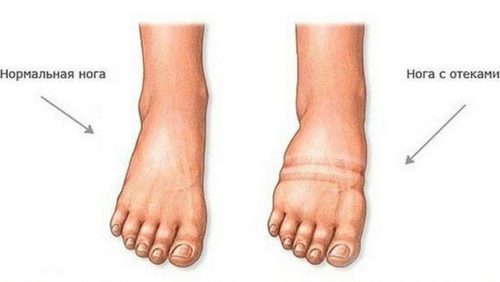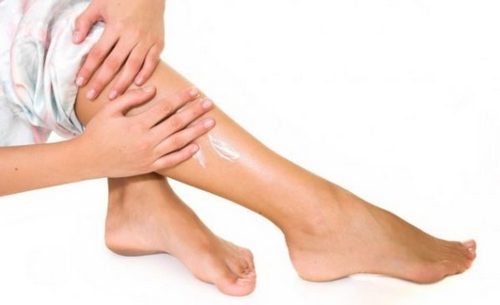Caesarean section is a serious abdominal operation performed to save the mother and future baby. It is shown if, for some reason, natural childbirth is impossible.
This surgical intervention gives a woman the joy of motherhood, but at the same time it can become a source of health problems.
So, very often edema occurs after cesarean, which worries and scares women, forcing them to seek medical help. Why does puffiness occur, is it always an alarm, you need to know a young mother. The cause of this condition, as a rule, is anesthesia, against which there is a violation of interstitial water metabolism.
Etiology of occurrence
Why legs swell after cesarean section – this question worries every woman who has encountered such a problem after surgery. The appearance of any edema is explained by fluid retention in the tissues of the body. Edema is a symptom, a manifestation of any pathology, therefore it is so important to identify their etiology.
Reasons for development:
- increased blood coagulation with the possible formation of blood clots;
- phlebeurysm;
- cardiac pathology leading to the development of circulatory failure;
- diseases of the urinary system;
- hormonal imbalance (malfunctioning of the thyroid gland, impaired water-salt and mineral metabolism);
- lack of protein in the diet or a violation of its absorption by the body;
- autoimmune diseases;
- HIV infection and other immunodeficiency conditions;
- acute viral and bacterial infections in the postoperative period.
Before the operation, local anesthesia of the lumbosacral spinal cord is performed. After all, it is this section of the central nervous system that provides the innervation of the pelvic organs. Against the background of anesthesia, sensitivity in the legs and lower body disappears, blood circulation changes, and fluid accumulates in the intercellular space. Therefore, swelling on the legs after cesarean section is so often observed.
In addition, young mothers are worried, because of which there is swelling on the uterus after cesarean. The reason is the same: interstitial water exchange disorders with accumulation of fluid in the intercellular space. This is due to the consequences of an extensive and traumatic surgical intervention affecting all layers of the uterus.

In what cases to see a doctor?
In pregnant women, blood coagulation increases, especially at the end of the term. This is a protective mechanism that saves from excessive blood loss during or after childbirth. Blood clotting and general anesthesia during surgery contribute to swelling of the soft tissues of the lower extremities.
Normally, swelling on the legs after cesarean is gradually reduced, so often there is no need for the help of a doctor. But sometimes severe edema after cesarean does not disappear on its own, and even begin to increase over time.
Indications for medical advice:
- swelling of the legs after cesarean persists 5-10 days after surgery;
- becomes more pronounced;
- differs in asymmetry – one leg was originally thicker, then the asymmetry increases;
- there are complaints of pain in the heart, palpitations;
- pain in the legs, aggravated with minimal motor loads;
- the general condition is violated.
Drug therapy
If the condition does not improve , how to get rid of edema after cesarean, the doctor decides on the basis of tests and examinations. Need a consultation of a phlebologist, therapist and other specialists. The dynamics of the state of edema in the uterus is controlled by an observing obstetrician-gynecologist.

Treatment of leg edema after cesarean section involves the use of drugs of several pharmacological groups .
The doctor may prescribe the following medicines:
- diuretics (Furosemide, Hypothiazide);
- non-steroidal anti-inflammatory drugs to relieve the phenomena of concomitant inflammation (Diclofenac, Ibuprofen, Movalis);
- antiplatelet agents to normalize the coagulation system (Aspirin, Curantil);
- drugs that tone and strengthen the venous wall (Eskuzan, Detralex);
- ascorbic acid to strengthen the vascular wall and immune system.
For leg edema, it is necessary to use preparations for external use in a complex: ointments and gels containing anti-inflammatory, venotonic substances (Lyoton, Heparin ointment, Essaven gel).
A young mother should carefully study the instructions for medicinal packaging so as not to harm herself and the baby. After all, many drugs are contraindicated in breastfeeding, and diuretics can adversely affect lactation.
Physiotherapy is also used for treatment – electrophoresis, laser, massage, physiotherapy exercises.
Home treatment
Medical treatment of leg edema after cesarean section, young mothers sometimes combine with folk remedies. Most often, if the legs swell after cesarean, traditional medicine suggests using concentrated infusions of medicinal herbs as an additive for foot baths, for which purpose plantain, chamomile, and oak bark are used.
Each foot alternately falls first in warm, then in cold water. This procedure strengthens and tones the walls of the vessels of the legs, improves blood circulation. Manipulation takes about 20 minutes. It is better to do procedures before bedtime for 2 weeks.
Herbal medicine can be used inside. A good effect is observed from the use of infusions of peppermint, bearberry, rose hip, and flax seeds. Outwardly applied compresses from raw potatoes, cabbage leaves.
It is necessary to wear compression stockings, as they help restore the tone of the venous vessels, reduce swelling of the legs. Elastic bandages can be used. It is important to move more, change body position more often, and do physical exercises regularly.
It is useful to master the techniques of self-massage of the lower extremities, lying on your back to control so that the legs are in an elevated position. Nutrition should be rich in protein and vitamins.
Prevention
During the period of carrying the baby, the expectant mother should lead a healthy lifestyle, move more, be in the fresh air. It is necessary to eat right, limit salty, smoked and spicy foods. It is important to maintain a positive attitude and believe in a favorable outcome of childbirth.
Like any surgery, cesarean section is fraught with complications. If the swelling does not decrease , you need to see a doctor who will find out the cause and prescribe therapy. Self-medication is unacceptable, it can cause irreparable harm to the baby and his mother. Many people wonder what to do with edema after cesarean section.
A comprehensive treatment consisting of diuretics, antiplatelet agents, vasodilators, gels and ointments for external use, will be prescribed by a specialist.



